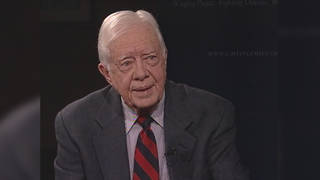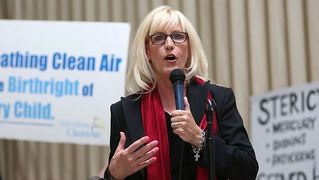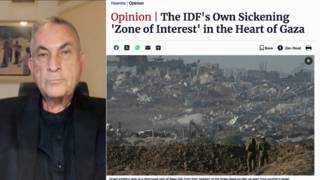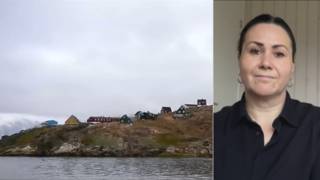
Related
Topics
Guests
- Erin Brockovichrenowned environmentalist, consumer advocate and legal researcher. Today, Brockovich and her team are investigating the major chemical spill in the Elk River, West Virginia.
- Mike Elklabor reporter for In These Times magazine.
The Freedom Industries site behind the West Virginia chemical spill is just a mile upriver from the state’s largest water treatment plant, owned by American Water. But despite the obvious dangers to the source of 16 percent of West Virginia residents’ water supply, the spill has exposed major holes in how the state regulates the dangerous chemicals used coal mining and processing, its leading industry. The chemical, 4-methylcyclohexanemethanol (crude MCHM), does not receive close federal or state oversight. Environmental inspectors have not visited the Freedom Industries facility since 1991. Under West Virginia law, chemicals storage facilities are not even subject to inspections. The plant also had no groundwater protection plan in place. We speak with Mike Elk, a labor reporter for In These Times magazine who has extensively covered chemical regulation in the United States, including at the West, Texas, fertilizer plant where 15 people died in an explosion last year. And we’re joined from West Virginia by Erin Brockovich, the renowned environmentalist and consumer advocate.
Transcript
AARON MATÉ: I want to go to Mike Elk in Washington, D.C. Mike, the background here, no inspections at this plant since 1991, but the company did report this chemical to regulators earlier this year. So, what happened? How is it that there was no oversight leading up to this spill?
MIKE ELK: Well, we’re seeing the same problems we saw in West, Texas. You had half-a-dozen regulators with potential oversight of this plant, but as the Department of Environmental Protection’s chief told Ken Ward of The Charleston Gazette, who, by the way, has been doing incredible, almost Pulitzer-quality reporting on this—as he told Ken Ward, “You know, this one just fell through the cracks.” And that’s what we heard after the West, Texas, disaster: “It fell through the cracks.”
Basically, some regulators knew about a groundwater permit they had at this plant. But this plant, they didn’t—you know, they didn’t have a sense of how many chemicals. The water authority had no idea what was there. They had never communicated about it in the past. And this is a major problem, because the Chemical Safety Board, which is a federal agency tasked with making recommendations on how to improve safety at chemical plants, three years ago, in 2009, recommended that the Kanawha Valley, which is where this plant is located, better coordinate among different agencies how to respond to these kind of disasters.
And there was no plan in place. The local emergency responders didn’t know about the chemicals. The water plant didn’t know about the chemicals. So there was no plan in place, and there was no communication between the different regulators about this. And this is the problem we see over and over again. There’s a lack of money going into regulation, and of the regulators that do exist, they don’t talk. And so, things fall through the cracks, like the Department of Environmental Protection said yesterday.
AMY GOODMAN: Let’s turn to a clip from a video produced by Elaine McMillion for the Charleston Daily Mail talking about Freedom Industries, the company which owns the plant on the Elk River where the leak occurred, contaminating the water supply of West Virginia’s capital, Charleston, and beyond.
DAVID BOUCHER: Founded in 1986, Freedom Industries produces chemicals for the mining, steel and cement industries. The site of the leak is dedicated to storage, with four million gallons of space available. The site doesn’t require a permit from the DEP since Freedom doesn’t make products there. Officials confirm the facility was never inspected by the DEP before the leak. The DEP issued a cease operations order Friday, and federal authorities are investigating Freedom.
AMY GOODMAN: Mike Elk, take it from there, and how you feel this fits into a larger pattern.
MIKE ELK: Yes. Well, yesterday, actually, the Department of Environmental Protections issued two complaints against Freedom Industries: one, for the failure to report the leak as soon as it occurred; two, for the failure to have any kind of prevention plan in place. They had a contamination wall there that could have prevented this water—you know, these chemicals from going into the water. But the contamination wall was so full of holes and cracks that the head of the DEP in West Virginia said he would be concerned if that foundation—if that was the foundation of his house. That’s how bad the quality of the concrete was. So, already we’ve seen two charges filed against Freedom Industries. They had no plan in place.
And I think there’s going to be a big criminal investigation going on there. The person heading it up is the U.S. attorney called Booth Goodwin. And Booth Goodwin is the U.S. attorney who has gotten several former Massey Energy officials convicted on very creative charges about obstruction of justice and conspiracy. And Booth Goodwin has already announced that he’s going to open a big criminal investigation. He’s got people on the ground. So it’s going to be interesting to see what happens.
But unless there’s serious jail time, unless there’s serious consequences, I think this is just going to be another tragedy that’s forgotten about. Kate Sheppard of The Huffington Post had a great article yesterday where—about interviews with different West Virginia Democrats, and a lot of West Virginia Democrats are kind of tepid about calling for new regulations in the wake of this, just like we saw in West, Texas, where Obama spoke at the memorial of the workers that died in West, Texas, and didn’t even mention the word “lack of regulations.” So—
AARON MATÉ: Mike—Mike—
MIKE ELK: —obviously this is an uphill climb.
AARON MATÉ: Mike, so, what has happened since the West, Texas, explosion, 15 people were killed? Was there any movement at all on regulation?
AMY GOODMAN: And explain when that happened.
MIKE ELK: Yes. The West, Texas, disaster happened last April. And what happened, it was a major explosion that killed 15 people. A similar situation, there weren’t the proper safety measures in place at the plant. The plant didn’t register with the proper authorities. Just a history of violations at this plant and lack of inspections. And so, what happened is that there were about six or seven different regulators going to the West, Texas, plant for different information, but they weren’t communicating.
So, Obama formed a chemical safety task force to look at how you could change communications and regulations between agencies. That task force is meeting today in Washington, D.C., for an open comment hearing, and they’re coming up with ways. But the work has been too slow. It’s been nearly 10 months, and yet we’re still repeating the same mistakes of West, Texas. And in this case, 300,000 people were put at potential risk and could still very much be at risk from these chemicals. We don’t know what these chemicals cause. We don’t know the long-term effects. We don’t know the effects that they might have on cancer 30 years from now.
AMY GOODMAN: Mike, how does the Obama administration compare with the Bush administration when it comes to environmental regulation?
MIKE ELK: Well, you know, I think, in some ways, you know, they’ve been tougher on coal, they’ve been tougher on these other things, but when it comes to the issue of workplace safety, they haven’t been really proactive on it. I mean, it’s like any other issue of workers’ rights: This administration could really care less about saying anything about it in public. And we haven’t seen the president address in a major way what is a big crisis.
Now, the question is, will this change it? I think it’s quite scary that 300,000 people couldn’t get water. Could you imagine being in that town and having to be a reporter, like, you know, a lot of the reporters that are there, and having no water and working night and day? I can’t imagine that as a reporter. That’s scary. That’s terrifying. And maybe it’ll lead to some change, but, you know, like Robert Byrd said, following each workplace safety disaster, typically people cry, they get upset about it, and once the outrage is gone, nothing happens.
AMY GOODMAN: Erin Brockovich, you’ve gone to West Virginia from California with a team of people to investigate. Now the state is beginning to partially lift the ban on tap water, five days after the chemical spill in the Elk River. How do people trust it? How do people believe that they should be able to drink their water? How do they know?
ERIN BROCKOVICH: They don’t. And I’ve said several times, you know, it’s a disaster of a very large magnitude. And turning a municipal system back on is not an easy process. It will be step by step, and there will be problems, and we may see the worst of this yet. We started to see some of that last night from people at the meeting—the color of the water, even after they’re flushing, the color of the water, the smell of the water, people saying that they are experiencing, you know, whether it be headaches or burning eyes or burning throats. And this is always a concern for people, because we don’t know what we’re drinking. And they don’t trust the fact that there’s this one PPM set for this chemical, a chemical we really don’t know a whole lot about. And we’ve set these MCLs based on a 40-year-old healthy white male. We do not take into consideration that that level may clearly not be safe for an elderly person, somebody recovering from chemotherapy or with a weakened immune system, and certainly young children.
So people that we’ve talked to around town, we’ve visited with in the hospitals, last night at the meeting, they don’t trust this. And that’s a big concern for them. And that’s the key word, that there is this lack of trust. And this is why we get so many people coming to us. And I just don’t know that we see the bigger picture. This is happening, not necessarily to this scale, but in every single state in the United States, sometimes community after community within the same state.
AMY GOODMAN: Erin—
ERIN BROCKOVICH: There was a—yes?
AMY GOODMAN: Before we go, I just want to play a clip of the trailer for the Academy Award-winning film about you and your fight, to remind people how serious these issues are, but also the possibility of what it means to win, and what does winning mean when people lose their lives and get sick. But this is that clip.
DR. JAFFE: [played by David Brisbin] You have no actual training.
ERIN BROCKOVICH: [played by Julia Roberts] I have kids. Learned a lot right there, yeah. And I’m great with people. When I was first out of high school, I got married and had a kid too young. I’m an extremely fast learner. You’ve got a really nice office.
DR. JAFFE: Look.
ERIN BROCKOVICH: You want my number.
GEORGE: [played by Aaron Eckhart] I do.
ERIN BROCKOVICH: How about this for a number? Six. That’s how old my daughter is. Eight is the age of my son. Two is how many times I’ve been divorced. Sixteen is the number of dollars I have in my bank account.
GEORGE: I’m so glad we got that out of the way, because I didn’t find you attractive, either.
ERIN BROCKOVICH: Then we’re even.
I’m smart, I’m hard-working, and I’ll do anything. And I’m not leaving here without a job. Don’t make me beg.
ED MASRY: [played by Albert Finney] In a law firm, you may want to rethink your wardrobe a little.
ERIN BROCKOVICH: Well, as long as I have one [bleep] instead of two, I’ll wear what I like, if that’s all right with you. You might want to rethink those ties.
Why are there medical records and blood samples in real estate files?
Would you mind if I investigate this a little further?
ED MASRY: What makes you think you can just walk in there and find what we need?
ERIN BROCKOVICH: They’re called boobs, Ed.
Can I just—
CLERK: Yeah, just—
TOXICOLOGIST: Hexavalent chromium can be very harmful.
ERIN BROCKOVICH: So, it kills people.
TOXICOLOGIST: Oh, yeah.
DONNA JENSEN: [played by Marg Helgenberger] You’re a lawyer?
ERIN BROCKOVICH: Hell, no. I hate lawyers. I just work for them.
THERESA DALLAVALE: [played by Veanne Cox] We’re going to have to spend a little time filling in the holes in your research.
ERIN BROCKOVICH: Don’t talk to me like I’m an idiot, OK?
THERESA DALLAVALE: I think we got off on the wrong foot here.
ERIN BROCKOVICH: That’s all you got, lady, two wrong feet in ugly shoes.
GEORGE: You’ve got to find a different job or a different guy.
ERIN BROCKOVICH: For the first time in my life, I’ve got people respecting me. Please, don’t ask me to give it up.
ED MASRY: You’re emotional. You’re erratic. You make this personal, and it isn’t.
ERIN BROCKOVICH: That is my work, my sweat, my time away from my kids! If that’s not personal, I don’t know what is!
DONNA JENSEN: We’re going to get them, Erin, aren’t we?
ERIN BROCKOVICH: They’re all signed. Every single one.
KURT POTTER: [played by Peter Coyote] How did you do this?
ERIN BROCKOVICH: Seeing as how I have no brains or legal expertise, I just went out there and performed 634 sexual favors. I’m really quite tired.
MS. SANCHEZ: [played by Gina Gallego] Twenty million dollars is more money than these people have ever dreamed of.
ERIN BROCKOVICH: These people don’t dream about being rich. They dream about being able to watch their kids swim in a pool without worrying that they’ll have to have a hysterectomy at the age of 20. By the way, we had that water brought in special for you folks.
AMY GOODMAN: Erin Brockovich. Erin, as we wrap up, what you learned from that, though as you move forward helping people around the country, what you think needs to be done?
ERIN BROCKOVICH: Well, we definitely—we have a lot of holes. And I think one thing that has been missing is something I learned then and I continue to learn and I continue to try to help people. They do know. And they do dream of a safe place to live. I think that we have disconnected and really forgotten what’s important. And they’re learning here in West Virginia. That is water, and the scarcity of it, the pollution of it, the laissez-faire that we are getting about protecting it, and their health. And they’re forgetting that they have a voice, too. It is those people in Hinkley, along with all of our help, that made the difference, because they no longer were afraid to speak up about what was important to them and use their voice and stand up, become proactive, say and do something, and push for change and push for a better world, not just for them, but for those that they leave behind. And that is the continual message, even 20 years later. And I think the time has really come where we need to re-address what our priorities are, the importance of our health, the value of our family, and just how precious water is, because without it, it’s not a game changer, it’s a game ender, for all of us. So, it’s [inaudible]—
AMY GOODMAN: Erin Brockovich—
ERIN BROCKOVICH: —message.
AMY GOODMAN: I want to thank you for being with us, renowned environmentalist, consumer advocate, legal researcher. And I also want to thank Mike Elk for joining us from Washington, D.C., labor reporter for In These Times magazine.
When we come back, Dog Whistle Politics: How Coded Racial Appeals Have Reinvented Racism & Wrecked the Middle Class. We’ll be speaking with Professor Ian Haney López. Stay with us.













Media Options